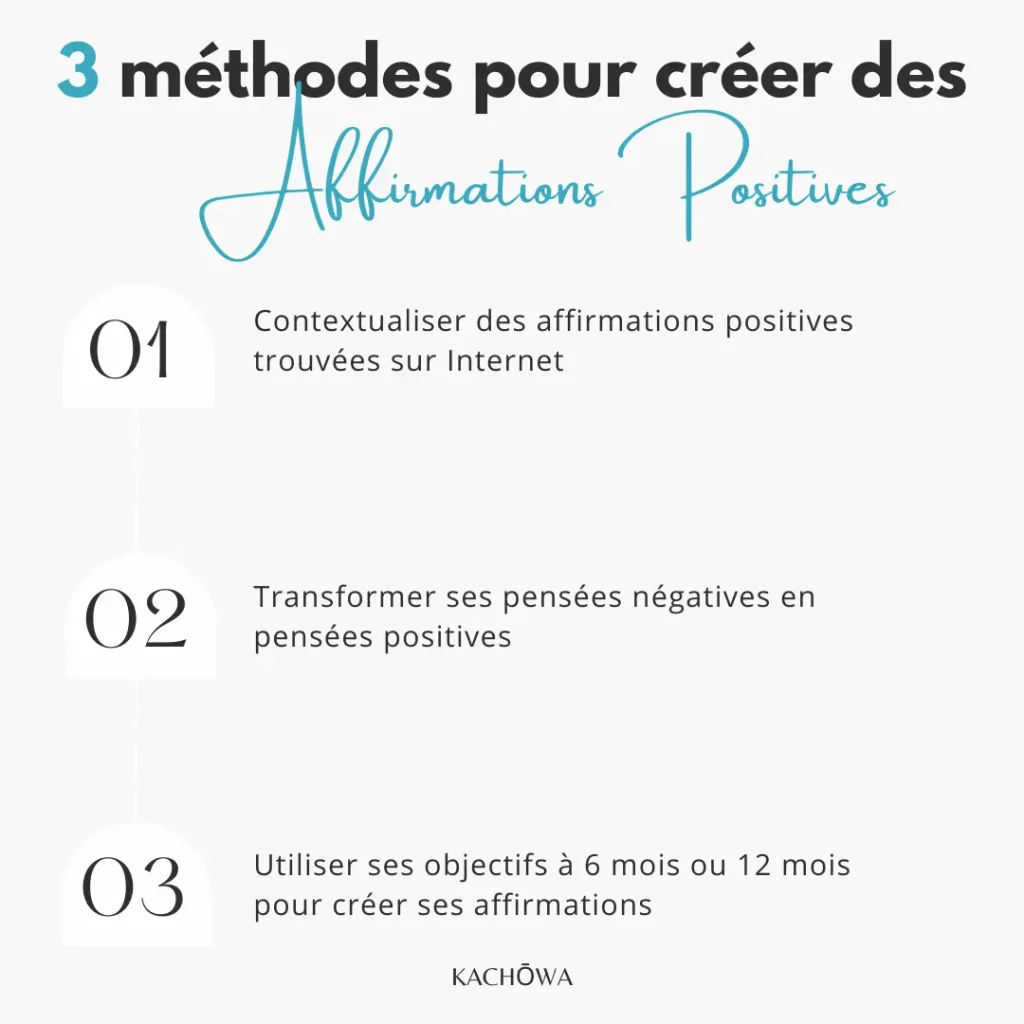
Positive Affirmations … does this thing really work?
Dernière mise à jour de l'article le 4 January 2026
Positive affirmations are a powerful tool for changing our thoughts and behaviour. Discover how to use them effectively to boost your personal development and achieve your goals in a sustainable way.
Key points to remember:
- Positive affirmations are a powerful tool for transforming our thoughts and state of mind.
- They can help us achieve our goals and improve our overall well-being.
- With regular practice, positive affirmations become a natural reflex.
Introduction
If you’re new to the world of personal development, you’ve probably quickly come across the hidden power of positive affirmations.
It’s clear that when you first enter this world, you wonder whether the people who practise this technique haven’t fallen on their faces a bit.
Since when has saying positive things like “I’m great” or “I succeed at everything I do” changed lives?
And yet you should know that it’s important to pay attention to the way we talk to ourselves, because this can then have an impact on our actions and behaviour.
Our internal dialogue, that is to say, our dialogue with ourselves, influences our decisions and (in)actions. We can say positive things about ourselves which, in this case, will be beneficial for us and help us to move forward. On the other hand, we can dwell on our fears and limiting beliefs, which will be counter-productive and tend to paralyse us into action.
That’s where positive affirmations come in!
In short, if you’re intrigued by this subject, I suggest you discover the art and hidden science of positive affirmations through this article.
And … if you’re still sceptical after reading this article, well, be the curious sceptic … test it out and make up your own mind!
What exactly is a positive affirmation?
It’s a positive phrase that we use to reshape negative or unhelpful thoughts in order to achieve a goal.
In itself, it’s super simple to practise this science. All you have to do is select some positive phrases (well … not quite … but we’ll see later) and repeat them to yourself regularly.
There are positive affirmations in all areas of our lives (Business, Well-being, Gratitude, Spirituality, Stress, etc.).
Affirmations are proven methods of self-improvement because of their ability to rewire our brains. These phrases reshape our thoughts and, in particular, our internal dialogue.
What’s the trick? How does it work?
Repeating positive affirmations several times increases the level of feel-good hormones.
Our brain will also form new groups of neurons called « positive thinking » and new connections.
Yes, you read that right.
In a way, our thoughts influence the way our brain works, so positive affirmations (and negative thoughts for that matter) will have an effect on our brain’s neuroplasticity.
Neuroplasticity is the ability of neurons to transform themselves in order to adapt to changes in their environment or to changes within the organism (according to the Larousse).
On the other hand, this is not a miracle recipe: the affirmations will work for some people and not for others.

Positive affirmations have an impact on our brain
Our brains don’t really distinguish between reality and imagination.
If you create a mental image of yourself doing something, it will activate the same areas of your brain as if you were actually doing it.
And in the case of affirmations, they will help you to break your pattern of negative thoughts , which will themselves generate counter-productive actions.
Why is that? Because if you regularly repeat positive phrases to yourself, your brain will start to integrate them as facts. That’s why the structure of positive affirmations is important.
They generally begin with I and are written in the present tense.
What are the benefits of positive affirmations?
Practising the art of positive affirmations can have an effect on your day-to-day motivation, boost your self-confidence and even help you focus on your strengths rather than your weaknesses.
I remember, for example, that when I was in a state of depression because of my job, saying positive affirmations to myself every morning helped me to get through this winding road, at a time in my life when I could only see the negative sides.
Every day, I repeated these affirmations to myself (which I had made up for myself… and therefore adapted to my personal situation) and they helped me to see the positive sides of the situation I was experiencing on a daily basis.
Warning: Saying positive affirmations to yourself doesn’t do everything. It’s only part of the action you need to take to move forward. It’s not because you tell yourself every day that you’re going to become a millionaire or that you’re going to find a job that corresponds to what you really want that you’re going to get what you want.
YOU HAVE TO TAKE ACTION.
It’s not the positive affirmation itself that’s going to create the change in you or in your life.
It’s you!
But it will help you create an environment that will encourage you to take action… because your brain will have the impression that you’ve already done it!

What we think, we become.
– Buddha
How to create effective positive affirmations
Now that you know how positive affirmations work, I’ll give you some tips to help you create effective positive affirmations.
If you’re looking for positive affirmations in general, just go to Google and type in “positive affirmations” and you’ll find what you’re looking for.
Here’s a list of examples:
- I wake up every morning feeling happy and enthusiastic about my life.
- I find joy and pleasure in the simplest things in life.
- I am successful in my life now, even as I work towards future success.
- I know exactly what I need to do to succeed.
- I live in the present and am confident about the future.
- I accept myself as I am and love myself deeply.
- I am fully present in all my relationships
Source : https://www.positivia.fr/100-affirmations-positives/
But in reality, if you want them to really work for you, you’re going to have to work on them a bit.
So here are 3 ways to build your own positive affirmations.
→ Method 1: Contextualise the positive affirmations found on the Internet
Simplest method.
Go to Google and type in “positive affirmations” + the subject that interests you (for example, positive affirmations for self-confidence) .
Then you select 10 affirmations that speak to you, that make sense to you. Then you rewrite these affirmations, adapting them to your particular situation.
Example:
On the Internet you can find the positive affirmation: I have confidence in myself and my abilities.
Well, you’re going to rephrase this statement by being a little more specific. For example, by specifying which ability you’re talking about: I have confidence in myself and in my problem-solving abilities.
By doing this exercise of rephrasing these statements, you’ll make them your own and they’ll be truer for you, because they’ll be applied to your personal situation.

→ Method 2: Turn your negative thoughts into positive ones
This method requires a little more time.
Each time you identify a negative thought that crosses your mind, you turn it into a positive affirmation.
For example: I suck at writing — that’s a negative thought and above all a belief. And I can talk about it because I held this belief for several years.
Telling yourself this sentence will only get you stuck. So instead of telling yourself that sentence over and over again, ask yourself the question “What bothers me about being rubbish at writing?”.
In my case, it was because I wanted to be able to write blog posts to inspire people.
So I turned that negative thought into one that was more focused on what I wanted to achieve and turned it in a P.O.S.I.T.I.V.E way: “I’m going to learn to write articles that inspire people”.
This statement is completely adapted to the context and, above all, it’s turned into an incentive to take action.
Get the idea?
→ Method 3: Use your 6-month or 12-month goals to create your affirmations
This is the method I’m personally using today.
It takes longer to put into practice because you have to :
- Carry out a 360° life review and a 6 or 12 month review.
- Identify 1 objective that you want to achieve in each area of your life.
Then for each of these objectives, you will associate a positive affirmation.
I’m going to illustrate the method with one of my old life goals.
For example, a few years ago I set myself the goal of launching my coaching business in June 2019.
My goal was: “To launch my coaching business in June 2019”.
And I transformed this objective into an affirmation that I told myself every day:“In June 2019, I will have launched my coaching business because I have the skills and knowledge to succeed in this activity.
And as I also practise visualisation, I might as well tell you that it has a much greater impact on my head, my body and my heart. I felt this affirmation throughout my entire being; it was really important to me because it was associated with one of my life goals.
And when my spirits were low, my brain would come up with new ideas to try out to achieve that goal. It wasn’t ‘Care Bear World’ every day, but I didn’t give up because I’d find at least one thing to do/test to keep trying to reach that goal… until the day I reached it…
As you will have realised, you need to adapt the affirmations to your particular situation to increase their effectiveness on your brain and, above all, to put in place actions that will enable you to take action.
The idea behind positive affirmations is that they give you a supportive and positive internal message, one that will make you want to take action and give your best to achieve the goals that are important to you.
And if you’re still not convinced, I invite you to try it for yourself and tell me what it’s like.
If you’d like to find out more about how positive affirmations can help you reprogram your brain, listen to episode #87 of the podcast Le Quart d’Heure d’Inspir’Action: Reprogramming your brain with positive affirmations.


Leave a Reply